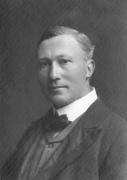|
|
||||||||||||||||||||||||
 |
Featured person
Recently added |
Major-General Sir John Megaw (1874 - 1958): |
||||||||||||||||||||||
John Wallace Dick Megaw was born at Ballyboyland, near Ballymoney, County Antrim son of a prominent farmer, John Megaw JP, who was a campaigner for tenant rights. John Megaw the son was educated at the Royal Belfast Academical Institution and Queen's College, Belfast, where he graduated BA in 1895 and MB with first class honours in 1899.
In 1900 he entered the Indian Medical Service and saw action in China, but in 1903 transferred to the civil side, his first posting being to Bengal as a district medical officer, then resident medical officer at the Medical College Hospital, Calcutta, where he came to know and work with Leonard Rogers (later Sir Leonard). They carried out and published a lot of research together, particularly the effects of hypertonic intravenous saline in cholera treatment, and links between beri-beri and epidemic dropsy. Megaw himself also studied bacteriology and pathology, including during periods spent in Europe.
In 1917, he was appointed Professor of Pathology and one of the three clinical physicians at the King George V Medical College, University of Lucknow, where he researched into dengue and sandfly fever, including being able to study the effects on himself of a sandfly bite. He was also an excellent administrator who organised high standards of research in all departments, raising the reputation of the college internationally. From 1921 until 1928 he was Director of the Calcutta School of Tropical Medicine with the ranl of Colonel. He was appointed Director-General of the Indian Medical Service in 1930. He moved to London in 1933 to succeed Leonard Rogers as medical advisor to the Secretary of State for India, President of the India Medical Office, and Lecturer (part-time) in the London School of Hygiene and Tropical Medicine. He retired in 1939 and took up farming in Kent. Other interests included his sympathy for Indian independence and the need to train Indian people for the challenges this would bring; his quasi-Malthusian views on population, especially regarding food supply; and the desirability of developing an international language. On retirement he held the rank of Major-General.
He published widely, including editorships of the Indian Medical Gazette, the Tropical Diseases Bulletin, and the Bulletin of War Medicine. With Leonard Rogers he published Tropical Medicine in 1930; it was regarded as a standard work and ran to five editions by 1952. His awards and honours included an honorary DSc from Queen's University, Belfast in 1934, appointment as honorary Physician to the King from 1930-1934, and his appointment as a Commandant de l'Ordre de Leopold II, by the King of the Belgians. He was appointed Commander of The Most Eminent Order of the Indian Empire in 1926 and Knight Commander of the same Order in 1933. He was elected President of the South Indian and Madras branch of the British Medical Association.
| Born: | 8 February 1874 |
| Died: | 24 October 1958 |
| Richard Froggatt |
| Acknowledgements: Wesley McCann |
| Bibliography: Ulster Medical Journal, August 1987 (Dr John Weaver & Sir Peter Froggatt); Dictionary of Irish Biography; private information |


Home | Our Policies | Plaques | Browse | Search | Sponsors | Links | Help | Contact
Privacy & Disclaimer | Cookie Policy | Site Map | Website Design By K-Point
© 2024 Ulster History Circle









